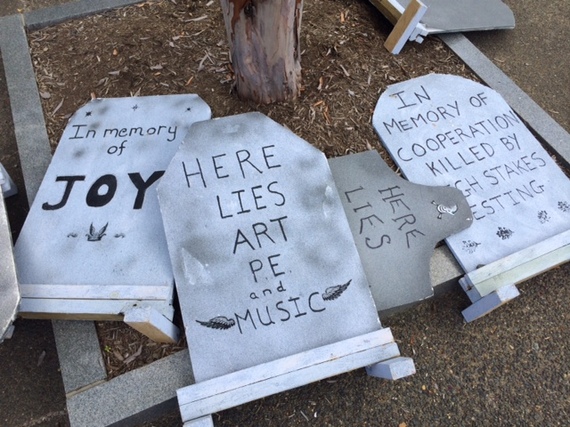
I boarded the Amtrak early Sunday morning in New York City and headed into Washington, DC. The weekend had finally arrived where teachers from across this nation were going to show our solidarity and use our voices to fight for public education. Educators, parents and students from 35 states occupied the U.S. Department of Education on Monday, July 28th -- and our efforts paid off. Four delegates from our group, the Badass Teacher Association (BATs) were invited into Secretary of Education Arne Duncan's office to explain to him what we stand for and why public education is so important to our nation's children.
Teaching is an issue near and dear to my heart. It was my dream when I was younger -- I would line-up my stuffed animals, and my little sister, and teach to them for hours. Even at the age of seven, I understood what it meant to engage my students -- creating lessons that my sister, and her stuffed-animal peers, would find completely captivating and inspiring.
Acting on that childhood dream, I went to college, earning both a bachelors and masters degree in education. I have had the privilege of teaching elementary and middle school students in Charlotte, North Carolina, and middle school students in Spanish Harlem and Upper Manhattan. Teaching was my truth, it was my life.
But last June, I turned in my official resignation as a 15-year veteran public school teacher. You see, I was tired and beaten down by the many politicians who value test scores over authentic learning. The worst days of my career were the ones where I left the building wondering if I was able to make a personal connection with each student who walked through my classroom door -- because budgets had been cut and my class sizes had reached 32 students. There were nights I laid awake, never falling asleep, because my end of the year evaluation depended on factors that were completely out my control, such as if Johnny could make it to school tomorrow after taking care of his three siblings while his parents worked two jobs to make ends meet.
The decision to leave my life-long dream was not an easy one. I took time to consider all angles -- especially my emotions of how it would feel to leave something I loved so dearly. On May 1, 2013, I opened up a notebook and stared at the blank pages. I was sitting at my desk, and I had 40 days remaining before I walked out of that classroom for the last time. I decided I would capture my feelings on paper, as they unfolded, and also record the stories from my students and their learnings and lessons during those last days of my career. I wanted to have a record of why I loved teaching so much.
After taking all those notes and capturing what it meant to be a teacher who was making a choice to leave before she became too bitter and jaded, I wrote a book. That book, my memoir, Breaking the Silence: My Final Forty Days as a Public School Teacher, will be released in late August (2014). It chronicles what is happening in public schools, behind closed doors, and how the current policies governing education are an injustice to our youth.
While in Washington, D.C., I took time to talk to countless teachers I had the privilege of sitting with for two days. Their stories are similar to mine -- they are facing budget cuts, dealing with over-crowded classrooms, having to explain to students why schools are removing recess and music and the arts, as well as fearing evaluations that are contingent upon student test scores. But there is one difference in our stories -- most of them are scared to speak their opinions in their districts or use their voices online for fear of losing their jobs. This saddens me. This enrages me.
One of the reasons I could write my book so candidly and openly is because I no longer have to fear the loss of my career for speaking out about what is right for children. This is not the case for most teachers who desire to advocate for what is best for students, defending their rights to a free and appropriate public education. Teachers across this nation know that if they do, repercussions are sure to take place. This is reprehensible.
Participating in this event in Washington, D.C. has taught me much about social activism and what it means to use our voices in this nation to enact change. It has taught me that while yes, I am one person, there are hundreds of thousands of teachers and parents -- just like me -- who have had enough when it comes to being pushed around and bullied by policies that are not helping us reach our students, teach our students, and love our students. It has taught me that my role in this fight is far from over, whether it be through activist writing, or listening to teachers when they need it most, or occupying the front steps of the U.S. Department of Education.
I am a teacher for life. Besides the work I am doing with public school teachers on the activist front, I am honored to also be working with student teachers in New York City -- assisting them with their student teaching placements, mentoring them on the toughest days when their spirits are low, and providing a safe and engaging classroom at the college level where we can talk about the real issues in schools, and how we can use our voices to share ideas and solutions, and fight for a public education system we are proud of once again.
